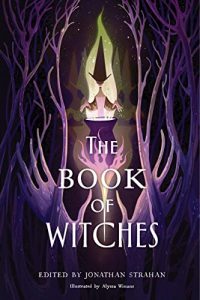Gary K. Wolfe Reviews The Book of Witches by Jonathan Strahan, ed.
 The Book of Witches, Jonathan Strahan, ed. (Harper Voyager 978-0-06-311322-0, $40.00, 512pp, hc) August 2023. Cover by Alyssa Winans.
The Book of Witches, Jonathan Strahan, ed. (Harper Voyager 978-0-06-311322-0, $40.00, 512pp, hc) August 2023. Cover by Alyssa Winans.
There’s an argument to be made (and I’m sure it has been) that liminal figures such as dragons and witches are among the great global unifiers, showing up in one form or another in almost every culture you could name. This is a point that Jonathan Strahan touched upon in his introduction to The Book of Dragons back in 2020, and it’s equally apparent in his latest anthology, The Book of Witches, which contains an even more diverse roster of contributors (only four authors appear in both volumes), and equally diverse notions of what witches can be or do. Like all the best theme anthologies, it repeatedly invites us to reconsider our prior assumptions about its topic. (With our customary good breeding, we pause here to note that Jonathan is the reviews editor of this magazine and my cohost on the Coode Street podcast.)
Like dragons, witches have undergone a good deal of rehabilitation over the past several decades, and while Strahan acknowledges that the old Margaret Hamilton Halloween-costume version still has its power, even such long-standing notions as witchery being women’s magic are more complicated these days. C.L. Clark’s ‘‘What Dreams May Come’’, for example, is narrated by a member of a witch family who has transitioned to male, and is summoned home to help rescue their mother from the ‘‘Dreamscape’’ – only to be confronted by disapproving aunts who insist that ‘‘using women’s magic makes me a woman.’’ A few other male witches show up (one of the most affecting is a college roommate in Indrapramit Das’s ‘‘As Wayward Sisters, Hand in Hand’’), but for the most part the tales focus on both the power and the victimization of women, sometimes with satisfying paybacks. One of the most satisfying is Maureen McHugh’s ‘‘Just a Nudge’’, featuring a contemporary setting like Clark’s story and concerning a nurse who barely uses her witch magic until she and her pregnant wife find themselves thrust into a feud with a viciously homophobic hoarder neighbor. Another is Premee Mohamed’s ‘‘So Spake the Mirrorwitch’’, in which the title character, a mirror-maker in a Puritanical village, uses her particular magic to foil a pair of annoyingly self-righteous witch hunters.
In fact, quite a few more men show up as witch-hunters than as witches, as in Mohamed’s tale. The most narratively inventive story, Kathleen Jennings’s ‘‘Catechism for Those Who Would Find Witches’’, is cast as a series of questions and answers regarding the origins and characteristics of witches. A brutal witch-hunting cop in Dhaka comes up against a witch offering a sanctuary for damaged and dying children in Saad Z. Hossain’s ‘‘Orphanage of the Last Breath’’. In E. Lily Yu’s grimly satirical ‘‘Witchfires’’, a witch hunter even finds a way to streamline his business with a portable crematorium for on-site witch burnings. The fundamentalist Christian mother in Fonda Lee’s ‘‘Nameless Here For Evermore’’, suspecting her daughter of possession, summons the local priest for an exorcism, but is forced to confront the truth when, after the daughter’s death, a classmate named Raven shows up at her house.
Lee’s allusion to Poe is no accident, and such allusions to literary, cultural, or mythological antecedents contribute to the book’s broad sense of diversity. The most delightful is Garth Nix’s ‘‘The Unexpected Excursion of the Murder Mystery Writing Witches’’, in which barely disguised versions of Dorothy Sayers, Agatha Christie, and Josephine Tey form a coven fighting ancient terrors in wartime London. Tade Thompson’s ‘‘The Luck Thief’’, an ingenious tale of a shapeshifting boyfriend, pointedly refers to Macbeth, while the industrialized Hell of Emily Y. Teng’s ‘‘The Cost of Doing Business’’ owes something to Dante. In the very strong opening story, P. Djèlí Clark’s imposingly titled ‘‘What I Remember of Oresha Moon Dragon Devshrata’’, a witch shows up offering to protect a village from an invasion by constructing a mechanical giant that looks a lot like Talos, while the title character in Darcie Little Badger’s ‘‘The Liar’’ is faced with a curse like Cassandra’s (although, in a neat twist, people do believe her when she lies). 1970s Hollywood films provide a kind of frame for Kelly Robson’s touching ‘‘In a Cabin, In a Wood’’, in which witches are brought in to comfort a dying mother, and Sheree Renée Thomas’s almost visionary ‘‘Mask of the Nautilus’’ ambitiously brings together everything from a version of Baba Yaga tales to Black Lives Matter.
Some of the stories even prominently incorporate SF elements. The witch in Ken Liu’s ‘‘Good Spells’’ not only helps out a harried worker in a nightmarish Amazon-style warehouse, but takes on assignments involving neural networks (including story-writing AIs!) and deep-learning machines that employ analog as well as digital computers (a seemingly minor point, but a surprising thing to learn about in a book about witches). Alaya Dawn Johnson’s ‘‘The Witch Is Not the Monster’’ is set in an inundated future Potomac basin, while the exiled old women in Angela Slatter’s ‘‘Through the Woods, Due West’’ have escaped from dystopian ‘‘treatment and testing facilities’’ in a grim near future. Closest to traditional horror stories are Tobi Ogundiran’s ‘‘The Nine Jars of Nukulu’’, with its nightmarish father; Usman Malik’s chilling ‘‘Night Riding’’, with its predatory sleep-clinic doctor getting a well-earned payback; and Amal El-Mohtar’s ‘‘John Hollowback and the Witch’’, with its echoes of the sort of rural folk fiction we used to see from Manly Wade Wellman. Other stories I enjoyed were Cassandra Khaw’s ‘‘Met Swallow’’, Andrea Stewart’s ‘‘Her Ravenous Waters’’, Tochi Onyebuchi’s ‘‘Déjà Vue’’, and Miyuki Jane Pinckard’s ‘‘The Academy of Oracular Magic’’, rather surprisingly the only tale set in a magic school. There are also poems by Linda Addison (whose serves as a kind of epigraph for the whole volume), Andrea Hairston, Millie Ho, and Sheree Renée Thomas, whose cantata-like ‘‘BOTANICA: A Song in Four Movements’’ achieves a sweeping epic sense in only a few pages. If the overall tone of The Book of Witches seems somewhat darker than that of The Book of Dragons, it may simply be that grappling with mythical beasts, which we generally don’t have to do in the real world, isn’t the same as marginalizing or exiling powerful women, which we do all the time. For that same reason, many of the tales in this sometimes sharp-edged but excellent anthology seem unnervingly relevant.
Gary K. Wolfe is Emeritus Professor of Humanities at Roosevelt University and a reviewer for Locus magazine since 1991. His reviews have been collected in Soundings (BSFA Award 2006; Hugo nominee), Bearings (Hugo nominee 2011), and Sightings (2011), and his Evaporating Genres: Essays on Fantastic Literature (Wesleyan) received the Locus Award in 2012. Earlier books include The Known and the Unknown: The Iconography of Science Fiction (Eaton Award, 1981), Harlan Ellison: The Edge of Forever (with Ellen Weil, 2002), and David Lindsay (1982). For the Library of America, he edited American Science Fiction: Nine Classic Novels of the 1950s in 2012, with a similar set for the 1960s forthcoming. He has received the Pilgrim Award from the Science Fiction Research Association, the Distinguished Scholarship Award from the International Association for the Fantastic in the Arts, and a Special World Fantasy Award for criticism. His 24-lecture series How Great Science Fiction Works appeared from The Great Courses in 2016. He has received six Hugo nominations, two for his reviews collections and four for The Coode Street Podcast, which he has co-hosted with Jonathan Strahan for more than 300 episodes. He lives in Chicago.
This review and more like it in the July 2023 issue of Locus.
 While you are here, please take a moment to support Locus with a one-time or recurring donation. We rely on reader donations to keep the magazine and site going, and would like to keep the site paywall free, but WE NEED YOUR FINANCIAL SUPPORT to continue quality coverage of the science fiction and fantasy field.
While you are here, please take a moment to support Locus with a one-time or recurring donation. We rely on reader donations to keep the magazine and site going, and would like to keep the site paywall free, but WE NEED YOUR FINANCIAL SUPPORT to continue quality coverage of the science fiction and fantasy field.
©Locus Magazine. Copyrighted material may not be republished without permission of LSFF.







